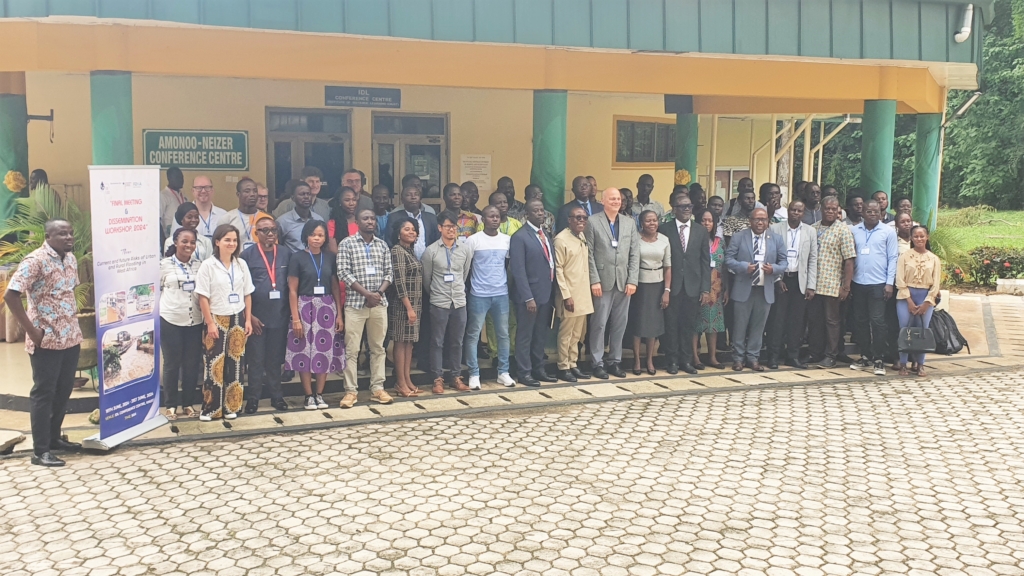Researchers on the "Current and Future Risks of Urban and Rural Flooding in West Africa" (FURIFLOOD) project are developing a guidebook on ecosystem-based flood risk-reduction measures in West Africa.
The book which is at the draft stage details flood risk and its components and gives a comprehensive analysis of how ecosystem-based disaster risk management could reduce flood.
At a research dissemination workshop in Kumasi, a Principal Investigator of the project, Professor Dr. Andreas Fink of the Karlsruhe Institute of Technology, indicated that the book which highlights early warnings and emergency management strategies will come in handy for stakeholders such as the meteorological agencies and National Disaster Management Organization (NADMO).
The FURIFLOOD Project aims to generate scientific knowledge regarding climate drivers of current and future extreme events related to flooding in West Africa and integrate this with case studies to better understand risks and impacts.
The West African Science Service Center on Climate Change and Adapted Land Use (WASCAL) is executing the four-year project, which started in August 2021 and is expected to end in July 2024.
Prof. Dr. Fink further revealed the project has developed a two-dimensional hydrodynamic modelling with a river analysis system to stimulate flood scenarios.
“Large efforts had been undertaken to gain information on parameters such as flood depths recorded by inhabitants to calibrate and validate models.
“These analyses would help identify which magnitudes of hazard were prone to become a severe risk for the population around streams in Kumasi,” he explained.
Through the project, the researchers have successfully replaced obsolete rain gauge instrumentation at 10 stations in the Ashanti Region with KNUST technicians also designing a new logger to relieve challenges in faulty original data loggers.
The College of Science of the Kwame Nkrumah University of Science and Technology (KNUST) is hosting the project in Ghana.

Co-Principal Investigator and Provost of the College of Science, KNUST, Prof. Leonard Amekudzi, lauded the multidisciplinary nature of the project and believed it would be instrumental in lessening flash flooding in the sub-region.
“KNUST was tasked to investigate the extreme rainfall, reducing floods, and begin to think about developing a revised intensive duration curve for not only the Ashanti Region but the entire country and entire West Africa,” he’s optimistic.
The Pro Vice-Chancellor of KNUST, Prof. Ellis Owusu-Dabo was happy the project has proffered solutions to the flood menace in the country.
Latest Stories
-
Brazilian Supreme Court justice threatens to arrest Bolsonaro
3 hours -
Queen Elizabeth II’s fashion to feature in exhibition
4 hours -
North Macedonia backs Morocco’s autonomy plan as sole basis for resolving Sahara dispute
4 hours -
Coach Lars Björkegren “proud” of Black Queens after penalty defeat to Morocco
4 hours -
Hosts Morocco to take on Nigeria in African women’s final
4 hours -
We were the better team – Queens coach Bjorkegren reflects on WAFCON 2024 semi-final loss
4 hours -
Mali court rejects appeal to release four Barrick employees, judge says
4 hours -
Kenyan man on death row in Saudi Arabia freed
4 hours -
Euro 2025: England beat Italy to reach finals
4 hours -
Ho Technical University partners with GhIE Branch 6 For Engineering and Innovation Week
4 hours -
The voices in the cockpit fuelling controversy over Air India crash
5 hours -
Mike Lynch estate and business partner owe HP Enterprise £700m, court rules
5 hours -
Trump administration pulls US out of UNESCO again
5 hours -
WAFCON 2024: Ghana’s Black Queens miss out on final after penalty loss to Morocco
5 hours -
Coca-Cola will roll out cane sugar Coke in US after Trump push
5 hours

